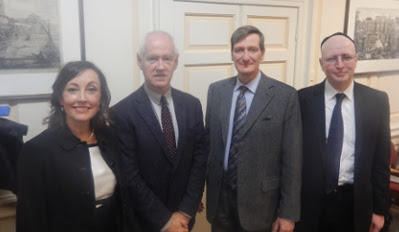Aileen Kavanagh's research was funded by a British Academy Mid-Career Fellowship commencing in 2014

Abstract of the Project: Underpinning all controversies surrounding the protection of rights in the UK is a deeper controversy about the respective roles of the branches of government, and an account of the relationship between them. Some take a court-centric approach, arguing that rights are the exclusive preserve of the courts. Only courts can be expected to be proper guardians of rights in the constitutional order, defending them against invasions from the legislative branch. Others argue that the courts and Parliament are rivals or adversaries, each vying for supremacy in the constitutional order on questions of rights. In The Collaborative Constitution, Aileen Kavanagh develops an alternative account. Rather than conceiving of the courts and Parliament as either entirely separate on the one hand, or as rivals on the other, she argues that we should view them instead as partners in a collaborative enterprise, where each branch has a distinct, but complementary, role to play. This alternative view – based on partnership and collaboration – is stepped out in detail in her forthcoming book.
Relevant Publications
Professor Kavanagh has published a number of papers which explore different strands of the idea of a collaborative constitution. These include the following:
- Aileen Kavanagh, ‘What’s so Weak about Weak-Form Review? The Case of the UK Human Rights Act 1998’ (2015) 13 International Journal of Constitutional Law 1008
- Aileen Kavanagh, ‘What’s so Weak about Weak-Form Review? A Rejoinder to Stephen Gardbaum’ (2015) 13 International Journal of Constitutional Law 1049.
- Aileen Kavanagh, ‘A Hard Look at the Last Word’ (2015) 35 Oxford Journal of Legal Studies 825.
- Aileen Kavanagh, ‘The Lure and the Limits of Dialogue’ (2016) 66 University of Toronto Law Journal 83.
- Aileen Kavanagh, ‘The Constitutional Separation of Powers’ in David Dyzenhaus & Malcolm Thorburn (eds) Philosophical Foundations of Constitutional Law (Oxford, OUP, 2016).
- Aileen Kavanagh (with Chintan Chandrachud) ‘Rights-based constitutional review in the UK: From Form to Function’ in John Bell & Marie-Luce Paris (eds), Rights-Based Constitutional Review – Constitutional Courts in a Changing Landscape (Edward Elgar, 2016).
- Aileen Kavanagh, ‘The Role of Courts in the Joint Enterprise of Governing’ in Barber, Ekins & Yowell (eds) Lord Sumption and the Limits of the Law (Oxford, Hart Publishing, 2016).
Click here for a fuller publication list
Workshop
At the end of her Fellowship, Aileen organised a high-level workshop at St John’s College Oxford entitled ‘Protecting Rights – Engaging Parliament’. This conference drew together a wide range of academics from across the world with key actors in the political and judicial branches of government. All interested members of the Oxford Law Faculty and postgraduate students were invited to attend this workshop and contribute to discussion. Aileen presented a paper entitled ‘Judges and Parliamentarians: Partners in a Collaborative Enterprise’ where she outlined some of her research findings to date.
Read more about the workshop See other events and conferences
Michaelmas Term Seminar Series, 2017
In 2017, Professor Kavanagh is running a new seminar series at Oxford entitled Topics in Comparative Constitutionalism. In this seminar, she discusses key topics in comparative constitutional law and constitutional theory together with visiting academics whose work intersects with her own. Last term, topics included dialogue, the culture of justification, the political constitution and the judicial role in constitutional review. This term will focus on issues concerning the separation of powers and a comparative analysis of the strike-down power with the UK’s declaration of incompatibility. Each seminar will start with a short presentation by each of the speakers, followed by a roundtable discussion. The seminars will look closely at just two or three readings, mostly from recently published work or work-in-progress by the speakers. The seminar is not associated with any particular course or examination, but all are welcome to attend. The seminar may be of interest to graduate students in the Law Faculty, especially BCL/MJur students taking Constitutional Theory, Comparative Human Rights and Comparative Public Law, or to research students working in the areas of constitutional law, constitutional theory or comparative constitutional law.
Download this term's outline See last term's seminar series

